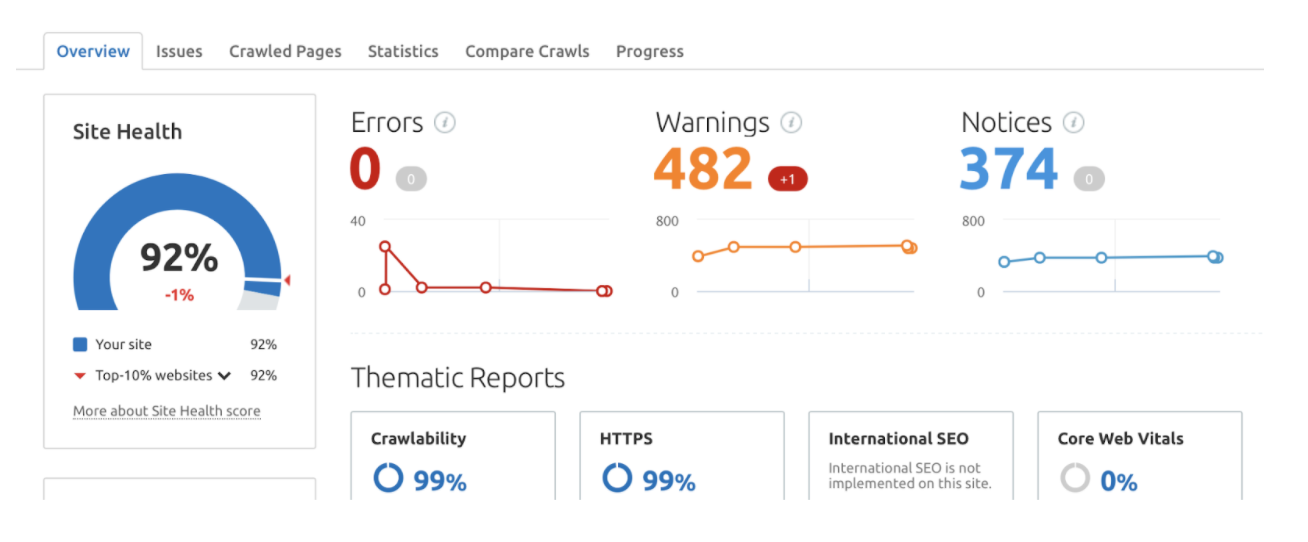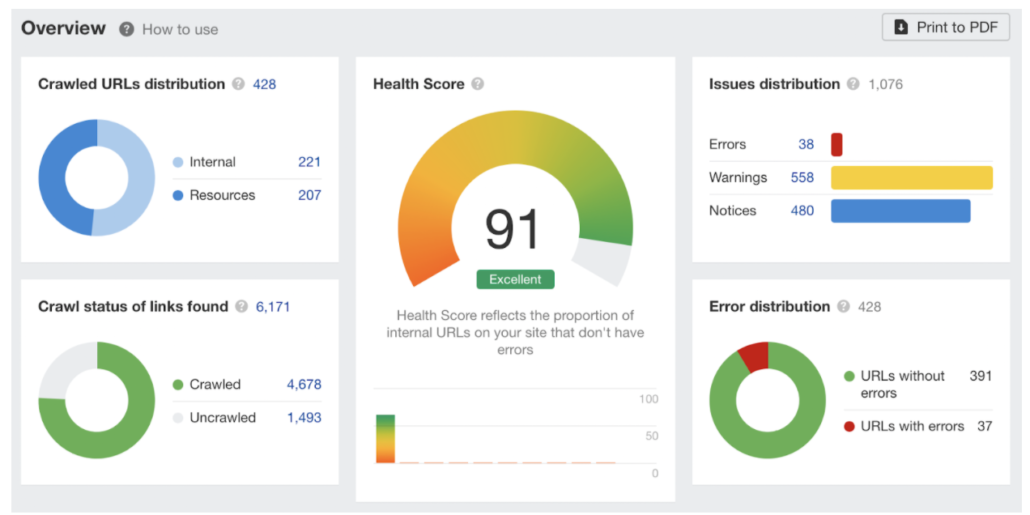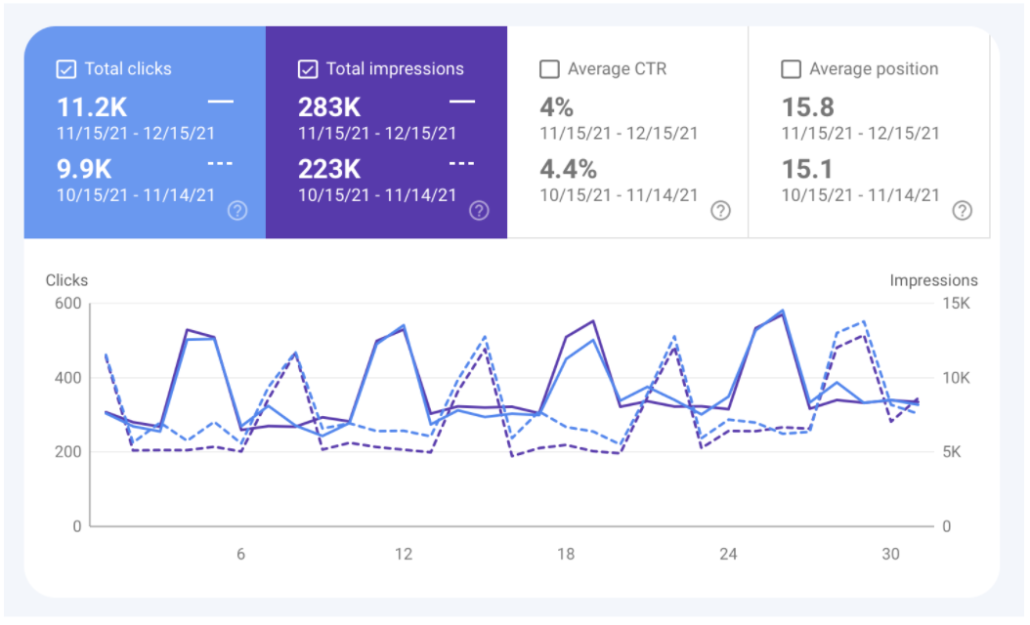How Does Site Health Impact SEO?
If you’re not familiar with some of the more advanced aspects of SEO, you may not have heard of site health before. However, if you’re trying to get more traffic from Google and other search engines, improving your site health can play a role in getting your site to outrank your competitors.
What is Site Health?
Site health is a metric that SEO tools, like SEMRush and ahrefs, provide to measure your site’s structure, speed, security and technical SEO.
SEO tools provide this metric to give you an idea of how your site compares to other websites from a technical SEO standpoint. If your site is full of broken links, slow-loading pages, and other technical issues, your site will be given a lower site health score than a similar website without those issues.
Site health itself is not a metric that Google looks at to determine whether or not your site ranks, but having an error-filled site could certainly impact your ability to rank for your target keywords. If you want to increase your site’s organic traffic and improve your keyword rankings, improving your technical SEO is a good place to start. Site health is a valuable metric because it allows you to easily monitor the progress you have made over time with your technical SEO changes.
Which Factors Play a Role in Your Site’s Health?
- Site Architecture and Crawlability: It’s important to make it easy for search engines to crawl and understand the content on your site.
- On-Page/Content Structure: Along with making sure that search engines can understand the structure of your site, it’s also important to make sure that the content on individual pages is easy to understand. This means making sure each page only has a H1 header, meta description, and title tag.
- Core Web Vitals: One of the best ways to improve your site health is to look at Google’s Core Web Vitals. Your site should load quickly and when loading it’s best if the content does not shift around due to slower loading elements on your page.
- HTTPS Security: If your site isn’t using HTTPS (as opposed to HTTP), now is the time to set that up. People visiting your site could be getting a warning message if you don’t have HTTPS setup with a current SSL certificate.
SEMRush and Ahrefs Both Use Three Categories of Site Health Issues
The two leading SEO tools, SEMRush and Ahrefs both assign issues to one of three categories based on the severity of the issue:
- Errors: Errors are issues of the highest severity detected on your website during the last audit.
- Warnings: Warnings are issues of medium severity detected on your website during the last audit.
- Notices: Notices are not considered severe issues, but we recommend that you fix them.
If you’re working on improving the technical SEO on a website, these dashboards are easy ways to see if the changes you’re making are accomplishing their goal.
SEMRush Site Health Dashboard
Ahrefs Site Health Score Report
What is a Good Site Health Score?
At Tuff, we aim to maintain a site health score of 90% or greater for our website and for our partners. This ensures that we don’t have technical issues preventing us from ranking on Google when we start publishing new content on the site.
According to SEMRush, the top 10% of websites have an average site health of 92%. If you want to be sure your site is healthy from a technical SEO perspective, 90% a good goal to shoot for.
Why You Should Monitor Your Site Health Score
If you are consistently publishing content and adding new pages on your site, it’s important to monitor your site health to keep an eye out for any technical issues with the new posts and pages that you’re publishing.
Site health can be useful for identifying issues that you wouldn’t notice when visiting your site, but that could have an impact on your search rankings. New content on your site could be uploaded without proper meta tags or without an SEO-friendly title tag, and this makes it more difficult for Google to understand what your page is about.
What is Site Health’s Impact on Your Site’s SEO?
Improving your site health can actually provide a sizable lift in traffic and search engine visibility for your site. The search console data below is for one of our partner’s websites that increased its site health from 72% to 95%.
This site saw a 13% increase in organic clicks and a 27% increase in organic impressions following the site health improvements we made. We’ve seen similar results from other sites that we’ve worked with after improving site health.
Fixing technical SEO errors and improving your site health can actually make a noticeable difference in your search rankings and typically these fixes can be made with just a few hours of backend work on your website.
Poor Site Health Could Be Preventing Your Site from Ranking
If you’re frustrated that your SEO efforts aren’t providing the traffic you were hoping for, we strongly recommend improving your site health as that could be something holding your site back from ranking and getting traffic.
Fixing technical SEO issues can require some knowledge of web content management systems (CMS) and some basic HTML skills. If you work with a web developer these fixes should be simple for them to make. If not, a technical SEO agency can help you make these changes to give your site the best possible chance of ranking for your target keywords.








